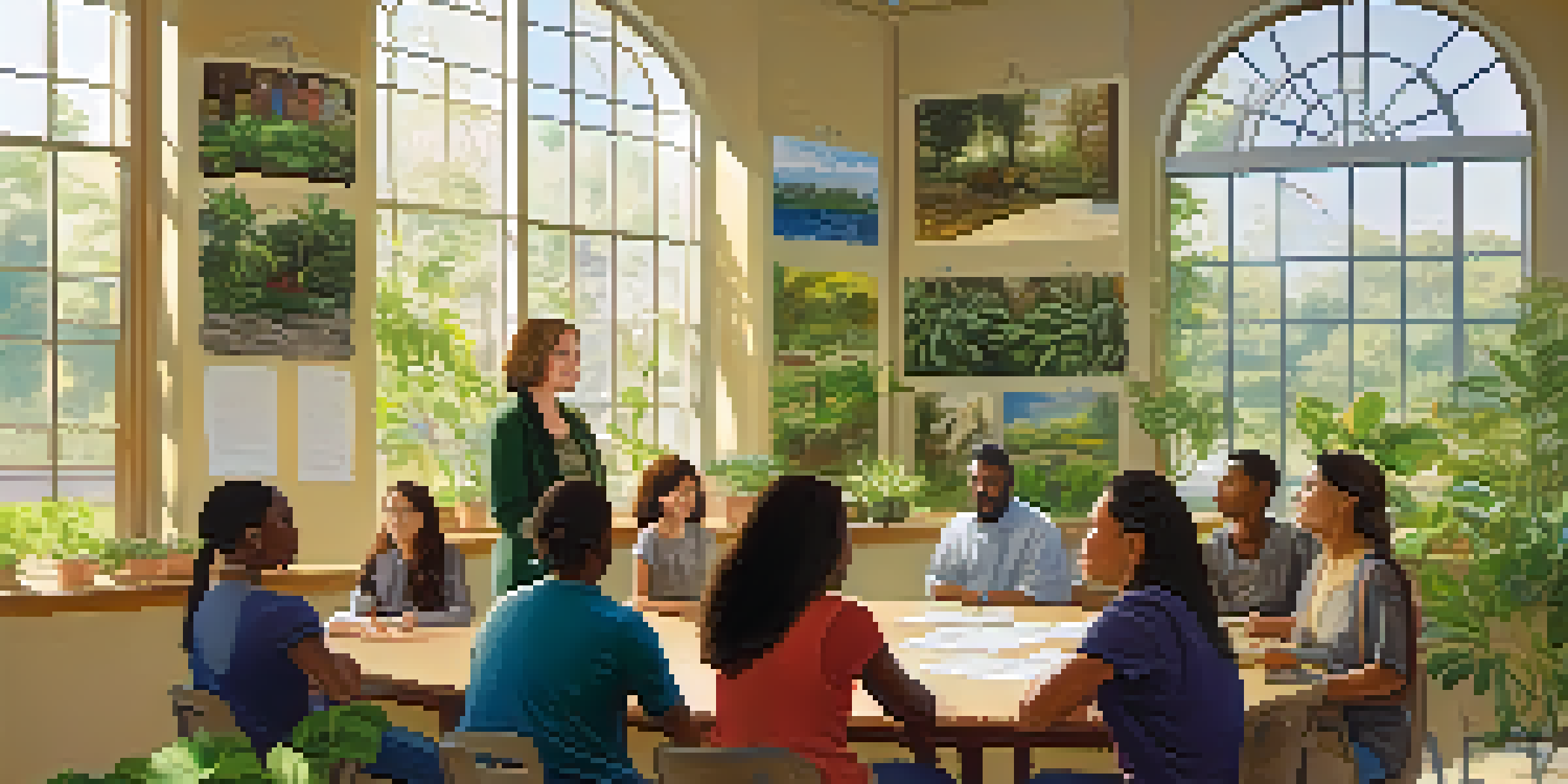Accountability in Spiritual Teaching: Principles and Practices

Understanding Accountability in Spiritual Contexts
Accountability in spiritual teaching refers to the responsibility teachers have towards their students and community. It’s about creating a safe space where learners can grow while knowing their teachers are committed to their wellbeing. This concept is vital, as it establishes trust and encourages open dialogue between practitioners and their guides.
Accountability breeds response-ability.
When we think of accountability, it's not just about monitoring progress; it's about nurturing a relationship built on mutual respect and understanding. Spiritual teachers, like any mentors, need to hold themselves accountable for their actions and teachings. This can mean regularly reflecting on their methods and being open to feedback from those they serve.
Ultimately, accountability in spirituality fosters an environment where both teachers and students can explore and question beliefs without fear. This collaborative approach helps everyone involved to deepen their understanding and practice, making the spiritual journey more enriching.
Principles of Accountability in Spiritual Teaching
The first principle of accountability is transparency. Spiritual teachers should be open about their teachings, intentions, and the processes they use. This openness not only builds trust but also allows students to understand the framework within which they are learning.

Another key principle is integrity. Teachers must practice what they preach, ensuring that their actions align with the values they teach. This alignment helps students see the real-life application of spiritual concepts, making them more relatable and impactful.
Accountability Builds Trust
Establishing accountability in spiritual teaching creates a safe space for open dialogue and mutual respect between teachers and students.
Lastly, compassion plays a significant role in accountability. Understanding that every student is on their unique path allows teachers to support them without judgment. This compassionate approach encourages a learning environment where mistakes are viewed as opportunities for growth.
Practices to Foster Accountability in Teaching
One effective practice is regular check-ins between teachers and students. These sessions provide a platform for students to share their experiences and for teachers to offer guidance. It’s an opportunity to reflect on progress and adjust teaching methods if necessary.
The greatest gift you can give to others is the gift of unconditional love and acceptance.
Another practice is the incorporation of peer feedback. Encouraging students to share their perspectives on each other's progress fosters a sense of community and collective accountability. It also helps students feel valued and heard, which can enhance their learning experience.
Lastly, teachers can model accountability by sharing their own challenges and learning experiences. This vulnerability not only humanizes them but also shows students that the journey is filled with ups and downs. It reinforces the idea that accountability is a shared journey, not just a top-down expectation.
The Role of Self-Reflection in Accountability
Self-reflection is a powerful tool in any teaching framework, especially in spiritual contexts. Teachers who regularly reflect on their practices can identify areas for improvement and growth. This practice not only enhances their teaching but also sets a strong example for their students.
Encouraging students to engage in self-reflection can also be incredibly beneficial. By fostering a habit of introspection, students can better understand their spiritual journeys and the accountability they owe to themselves. This creates a more engaged and conscious learning environment.
Community Supports Growth
A supportive community fosters accountability, allowing members to hold each other accountable and enhancing their overall spiritual experience.
Ultimately, self-reflection nurtures a culture of accountability where both teachers and students are actively involved in their growth. It helps to create an atmosphere where everyone is committed to the learning process, understanding that accountability is a shared responsibility.
Creating a Supportive Community for Accountability
Building a supportive community is essential for fostering accountability in spiritual teaching. Such a community encourages open dialogue, where individuals feel safe to express their thoughts and feelings. This supportive atmosphere allows for honest discussions about challenges and successes alike.
Within a community, members can hold each other accountable, creating a network of support that extends beyond the teacher-student dynamic. This shared responsibility helps to cultivate a deeper sense of belonging and commitment to the spiritual journey.
Moreover, when individuals feel supported, they are more likely to take accountability seriously. A community that promotes mutual respect and understanding encourages each member to engage fully with their spiritual practice, enhancing the overall experience.
Challenges to Accountability in Spiritual Teaching
Despite its importance, accountability in spiritual teaching faces several challenges. One major issue is the lack of clear guidelines or standards that define what accountability looks like in different spiritual contexts. This ambiguity can lead to misunderstandings about expectations between teachers and students.
Another challenge is the potential for power dynamics to overshadow accountability. In some spiritual settings, the teacher-student relationship can become hierarchical, making it difficult for students to voice concerns or feedback. This imbalance can stifle open communication and hinder accountability.
Self-Reflection Enhances Learning
Encouraging self-reflection among both teachers and students nurtures a culture of accountability and shared responsibility for growth.
Lastly, societal stigmas around discussing spiritual failures can create barriers. Many individuals may feel embarrassed to admit when they struggle with their spiritual practices, which can prevent meaningful conversations about accountability. Addressing these challenges requires a commitment to fostering an open and honest environment.
The Future of Accountability in Spiritual Teaching
Looking ahead, the future of accountability in spiritual teaching appears promising as more educators embrace transparency and ethical practices. The rise of online learning platforms has also made it easier for teachers to connect with students and maintain accountability, regardless of geographical barriers.
Innovative approaches, such as mentorship programs and collaborative learning environments, are likely to gain traction. These methods encourage a more interactive and participatory approach to spiritual education, where accountability is a shared goal rather than a prescribed obligation.

Ultimately, as the conversation around accountability in spirituality continues to evolve, it will be essential for teachers and students alike to remain committed to fostering a culture of openness and support. This evolution will not only enhance individual spiritual journeys but also strengthen the community as a whole.